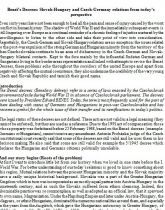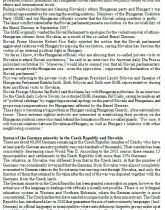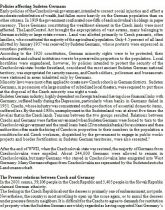Hľadaj
Zobraz:
Univerzity
Kategórie
Rozšírené vyhľadávanie
45 171
projektov
Home » Semestrálna práca » Beneš’s Decrees: Slovak-Hungary and Czech-Germany relations from today’s perspective
Beneš’s Decrees: Slovak-Hungary and Czech-Germany relations from today’s perspective
| Prípona .doc |
Typ semestrálna práca |
Stiahnuté 6 x |
| Veľkosť 0,1 MB |
Jazyk anglický |
ID projektu 3904 |
| Posledná úprava 23.06.2017 |
Zobrazené 1 714 x |
Autor: - |
 Zdieľaj na Facebooku
Zdieľaj na Facebooku |
||
| Detaily projektu | ||
- cena:
5 Kreditov - kvalita:
83,1% -
Stiahni
- Pridaj na porovnanie
- Univerzita:Univerzita Mateja Bela v Banskej Bystrici
- Fakulta:Fakulta politických vied a medzinárodných vzťahov
- Kategória:Humanitné vedy » Politológia
- Predmet:-
- Študijný program:-
- Ročník:-
- Formát:MS Office Word (.doc)
- Rozsah A4:13 strán
Even sixty years have not been enough to heal all the pain and sense of injury caused by the worst conflict in human history. The shadow of World War II and the immediately subsequent events is still lingering over Europe as a continual reminder of a chronic feeling of injustice nurtured by the unwillingness to listen to the other side and take their point of view into consideration. Regrettably, the Czech-German and Slovak-Hungary relations are no exception: the issues related to the post-war expulsion of the strong German and Hungarian minority from the territory of the then Czechoslovakia continue to be an area of disharmony in the Czech-German and Slovak-Hungary bilateral contacts. Kept to the fore mainly by the influential Sudeten German and Hungarians living in the border areas representation and linked with attempts to revise the Beneš Decrees, these problems echo throughout the corridors of the united Europe and apart from negatively affecting the mutual coexistence, they also undermine the credibility of the very young Czech and Slovak Republic and tarnish their good name.
Introduction
The Beneš decrees (Benešovy dekrety) refer to a series of laws enacted by the Czechoslovak government of exile during World War II in absence of Czechoslovak parliament. The decrees were issued by President Edvard BENES. Today, the term is most frequently used for the part of them dealing with status of Germans and Hungarians in post-war Czechoslovakia and has become a symbol for the whole issue of their transfer and its ramifications in today's politics.
Introduction
The Beneš decrees (Benešovy dekrety) refer to a series of laws enacted by the Czechoslovak government of exile during World War II in absence of Czechoslovak parliament. The decrees were issued by President Edvard BENES. Today, the term is most frequently used for the part of them dealing with status of Germans and Hungarians in post-war Czechoslovakia and has become a symbol for the whole issue of their transfer and its ramifications in today's politics.
Kľúčové slová:
medzinárodné vzťahy
benešove dekréty
anglický jazyk
angličtina
sudety
Nemecko
Česko
Obsah:
- Introduction
And our story begins (Roots of the problem)
The Present situation
Status of the German minority in the Czech Republic and Slovakia
Nationalism of Sudeten Germans
Policies affecting Sudeten Germans
The Present relations between Czech and Germany
The Great Hungarian Empire - concept
Conclusion
LITERATURE:
Zdroje:
- Jiří Musil, Zdeněk Suda: Czech-German Relations. A Sociological View... 135-147
- Miroslav Kunštát: Czech-German Relations after the Fall of the Iron Curtain... 149-172
- Jan Pauer: Moral Political Dissent in German-Czech Relations... 173-186
- Eva Broklová: Opinions of German Activist Parties in Czechoslovakia 1918-1938... 187-204
- Ton Nijhuis: Historical Memory and the Plea for a National Interests Based German Foreign Policy... 205-217
- Václav Houžvička: Germany as a Factor of Differentiation in Czech Society... 219-239
- František Zich: Germany and the Germans in the Attitudes of People Living on the Czech-German Border... 241-259
- Břach, R.: Die Aussenpolitik der Tschechoslowakei zur Zeit der “Regierung der nationalen Verständigung”, Baden-Baden 1992, esp. pp. 51-71.
- Rudé právo, 3.1.1990
- Meny, Y.: Government and Politics in Western Europe, Oxford: Oxford University Press, 1993
- Alexandr Ort: Edward Benes - European Politician, Prague 1997 (pp.15-23)
- Radomír Luza: The Sudeten German Question, Cedar Rapids 2003 (pp.17)
- Michael G. Roskin: The Rebirth of East Europe, New Jersey 1991 (pp.66-164)
- Verheijen, T. and A. Rabrenovic: Research Protocol of the Comparative Study of Politico-Administrative Relations in Central and East European States, Working Paper, Belgrade University and University of Limerick, 1998







